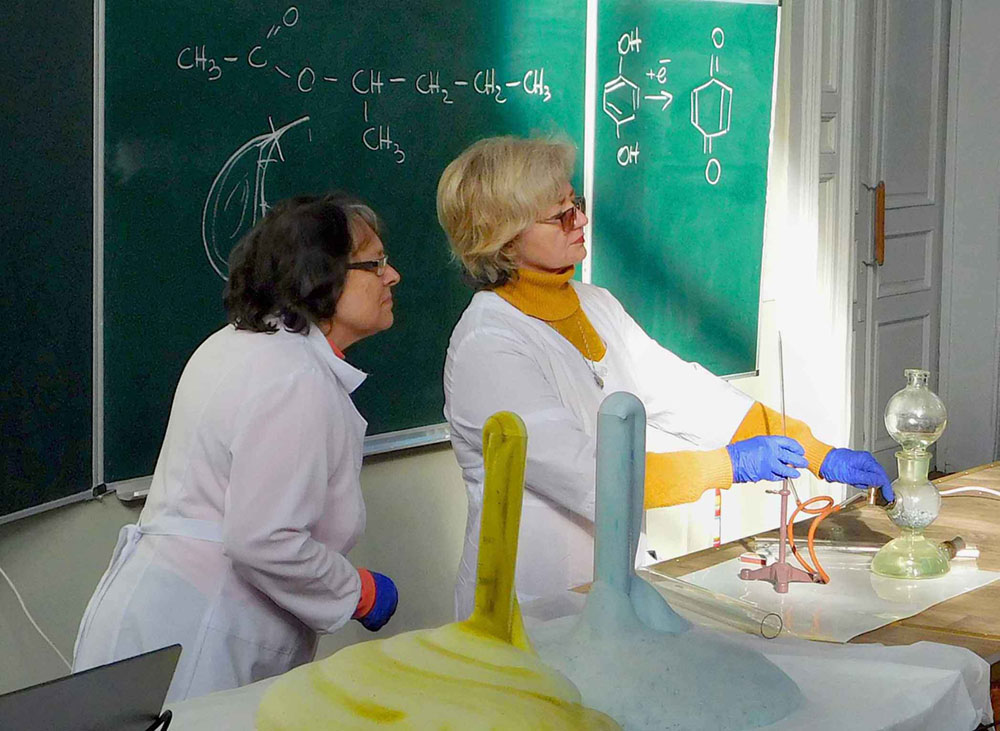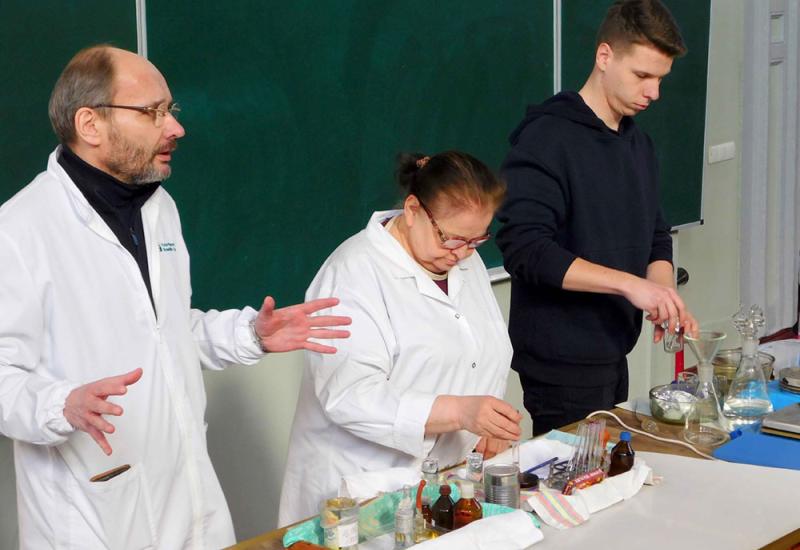School vacations are not just a time for relaxation. For students, it is also an opportunity to plunge into the fascinating world of science. So, at the end of March, the Big Chemical Auditorium of the Faculty of Chemical Technology of Igor Sikorsky Kyiv Polytechnic Institute invited everyone to discover the world of formulas, laboratory experiments, and interesting results.
On March 27, the Department of Educational Work and the Faculty of Chemical Technology held a chemical show "Chemical Technologies in Action" for schoolchildren, applicants and all interested parties. It was organized as part of the KPI School project.
📖
Teachers and staff of the departments of the Chemical Technology Faculty have once again confirmed that knowledge of chemistry is not only knowledge of the facts and theories that are described in class and in school textbooks, but also the ability to explain the nature of chemical phenomena in everyday life. A series of interesting experiments was devoted to demonstrating chemical transformations and examples of the use of chemical technologies. The show was hosted by Vadym Potaskalov, Associate Professor of General and Inorganic Chemistry, who did not forget to remind the audience about safety and rules of conduct in the laboratory and at home. The successful combination of experiments, presentations of departments and laboratories and the use of an interactive whiteboard to study the intricacies that allow us to understand what chemicals are for created an unforgettable atmosphere.
At the show "Chemical Technologies in Action," associate professors of the Department of Electrochemical Production Technology Mykhailo Byk and Svitlana Frolenkova demonstrated the operation of a prototype electrolyzer for producing hydrogen and oxygen and an environmentally friendly fuel cell used in state-of-the-art hydrogen cars that are gradually replacing electric cars. The example of the process of electroless deposition of copper electroplating on steel products impressed the audience with its speed. Andrii Lapinskyi, Senior Lecturer at the Department of Inorganic Substances Technology, Water Treatment and General Chemical Technology, demonstrated express water quality analysis systems and demonstrated the process of preparing water samples before the study, as well as spoke about the methodology for determining water hardness and conducted an experimental study of tap water samples (by the way, its quality indicators were within the normal range). Associate Professor of the Department of Physical Chemistry Tetiana Pylypenko and her students demonstrated the "wonders" of cosmetic chemistry - the production of the most common fat-based emulsion cosmetic cream on the market using natural ingredients. Thanks to an interesting experiment and explanations of how this can be done at home, the participants of the Chemical Show now know about it. Senior Lecturer of the Department of Organic Chemistry and Technology of Organic Substances Andrii Kushko and his colleagues demonstrated the process of applying a bright coating to Christmas tree ornaments (the "silver mirror" reaction). Many people were interested in the story about the production of synthetic flavors that give, for example, confectionery products an attractive taste and aroma, and one of the flavors was synthesized. However, A. Kushko warned the audience: "An excessive amount of such substances in a product can have a negative impact on human health." Ihor Pylypenko, Associate Professor of the Department of Chemical Technology of Ceramics and Glass, presented the technology of glass tempering in ordinary water. Dutch drops (also called Prince Rupert's drops) are formed when molten glass is dripped into cold water, which causes the drops to have strange properties: they can withstand a hammer blow, but crumble into dust even with the slightest damage to the so-called tail, as the audience could see for themselves. The Department of Chemical Technology of Composite Materials was represented by Assistant Professor Yurii Kovalenko, who demonstrated through an experiment that in modern production conditions, any variation of not only the color but also the functions of products is possible by introducing specialized organic and inorganic binding additives in accordance with the needs during operation, both for civilian and strategic needs. The staff of the Department of General and Inorganic Chemistry, including the head of the laboratory Olena Shuranova and the leading engineer Tetiana Kushmyruk, also demonstrated many interesting experiments. The decomposition reaction of hydrogen peroxide, which resulted in the formation of two huge "snakes" in patriotic yellow and blue colors, was greeted by the audience with applause. The burning of hydrogen (with a "musical effect"), the decomposition of ammonium dichromate ("volcanic eruption"), a colorful "chemical cocktail", and the explosion of a noisy mixture ("flying can") left no one indifferent in the audience.
"Such chemical shows are designed to make it easier to understand the basics of chemistry as a natural science," says Natalia Tarasenko, a senior lecturer at the Department of General and Inorganic Chemistry, who is responsible for career guidance at the HTF. Therefore, the team of the KhTF plans to organize such "chemical" meetings in the future. "The methodology of teaching chemistry at school solves three main tasks: what to teach, how to teach and how to learn. It is clear that during school lessons, students do not fully master the content of chemical science, but only learn its basics. They do not study chemistry in the historical sequence of scientific discoveries, but according to a systematic approach that is determined by didactic requirements," she says.

"Modern society needs educated young people who would be able to implement their own developments in various fields of science, technology, and production in their professional activities. The popularization of higher education and science begins with the active participation of schoolchildren and students - members of the Junior Academy of Sciences in research conducted by research institutions and universities of Ukraine. The Chemical Society always welcomes everyone who is interested in chemistry. The key to the treasure trove of knowledge about many chemical phenomena is held by teachers and employees of the HTF. My colleagues are ready to share their knowledge with future students," says Olga Kachorovska, a senior lecturer at the Department of General and Inorganic Chemistry, who has been coordinating the cooperation between the KTP and the Junior Academy of Sciences for many years.

